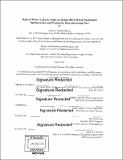Hybrid Make-to-Stock, Make-to-Order (MTS-MTO) production optimization and predictive manufacturing plan
Author(s)
Thoma, Andrew Joseph
DownloadFull printable version (9.639Mb)
Alternative title
Hybrid Make-to-Stock, Make-to-Order production optimization and predictive manufacturing plan
Hybrid MTS-MTO production optimization and predictive manufacturing plan
Other Contributors
Leaders for Global Operations Program.
Advisor
Thomas Roemer and Chris Caplice.
Terms of use
Metadata
Show full item recordAbstract
The rapid growth of the Print on Demand (POD) business has necessitated a capacity expansion plan that spans the next five years. After analyzing sales data it was determined that more titles are selling in larger quantities. For these titles, the current make-to-order model does not represent the optimal manufacturing and fulfillment strategy. This preliminary insight led to the realization that an inventory model that uses demand forecasts and a cost analysis for each title should be used to determine the optimal ordering quantity for qualifying titles, in an initiative called high volume pre-builds. Additionally, an initiative called predictive manufacturing should be used concurrently to provide customer experience improvements to titles that sell in large quantities but do not qualify for high volume pre-builds. The development of a hybrid make-to-stock, make-to-order (MTS-MTO) production optimization model will lead to pre-building between 1.1M and 2.1M retail units per year, but could be scaled upward. Pre-building allows for cost savings through economies of scale in manufacturing and through transportation savings based on inventory placement and network topology. An additional 300K+ annual retail titles will be eligible for predictive manufacturing, which will also benefit from transportation savings. The customer experience improvements alone would make these initiatives worth pursuing even if they were NPV neutral or slightly negative. However, they are a clear win when also considering overall integration and cost savings. These initiatives will drive a lower cost structure for book manufacturing that benefits all stakeholders (Amazon, authors, and customers), which will lead to the continued, rapid growth of POD.
Description
Thesis: M.B.A., Massachusetts Institute of Technology, Sloan School of Management, 2016. In conjunction with the Leaders for Global Operations Program at MIT. Thesis: S.M. in Engineering Systems, Massachusetts Institute of Technology, School of Engineering, Institute for Data, Systems, and Society, 2016. In conjunction with the Leaders for Global Operations Program at MIT. Cataloged from PDF version of thesis. Includes bibliographical references (pages 77-78).
Date issued
2016Department
Leaders for Global Operations Program at MIT; Massachusetts Institute of Technology. Engineering Systems Division; Massachusetts Institute of Technology. Institute for Data, Systems, and Society; Sloan School of ManagementPublisher
Massachusetts Institute of Technology
Keywords
Sloan School of Management., Institute for Data, Systems, and Society., Engineering Systems Division., Leaders for Global Operations Program.